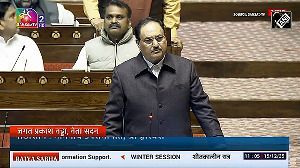 Things, such as the Reserve Bank of India leaving it to the insurance regulator and the stock market regulator to slug it out over who should regulate unit-linked insurance schemes (Ulips), provides enough reason for the government to play the referee through a super regulator, says Finance Minister Pranab Mukherjee in an interview to news channel NDTV Profit. Edited excerpts:
Things, such as the Reserve Bank of India leaving it to the insurance regulator and the stock market regulator to slug it out over who should regulate unit-linked insurance schemes (Ulips), provides enough reason for the government to play the referee through a super regulator, says Finance Minister Pranab Mukherjee in an interview to news channel NDTV Profit. Edited excerpts:
On the question of the super regulator, which the Reserve Bank of India (RBI) is a little unhappy with, the whole world is moving towards fewer regulations. But, with the Financial Stability and Development Council, we seem to be regulating the regulator.
No, it's not correct. Regulators are expected to work within their domain. The Act which creates the regulators defines their jurisdiction.
But if there are occasions when they transgress each other's jurisdiction, the question arises whether the government should remain a silent spectator as both of them fight in court and carry on for an indefinite period in our judicial system or whether the government has a role to play as mediator.
The regulators have not come down from Heaven. They were not born with their rights. They are created by Parliament by enactment, which also defines their jurisdiction.
Is RBI
(Interrupts) Yes, RBI was there in the case of IRDA (Insurance Regulatory & Development Authority) and Sebi (Securities & Exchange Board of India). It was RBI which advised them to sort things out themselves, which they could not do. Why did the government have to intervene? RBI had the authority to mediate and intervene. It did so and the final advice it gave was to sort it out among themselves by bilateral discussions.
On the ULIP issue?
One issue And when they didn't do it, a situation came when the government had to step in. Therefore, all regulatory bodies created by parliamentary enactment will fully enjoy their autonomy, but if there be a situation where one regulatory authority transgresses another's authority, we simply can't allow the government to remain a mute spectator.
Doesn't that take away RBI's autonomy?
There is no question of taking anybody's autonomy -- any regulatory authority's. Simply making a propaganda doesn't make it a reality.
You recently talked about governance deficit in Kashmir. Was that only implicating the state government, or the Centre as well?
Kashmir is not that simple. Kashmir is not like any other state in India. Kashmir has its own special status, which is recognised by Article 370 of the Constitution, due to the series of developments which have taken place over the years and the worst type of terrorist activities being patronised, supported and diverted from the other sides of the border.
Therefore, the problem is complex and a complex problem cannot have a simplistic solution.
You said in your statement that there was trust deficit and governance deficit. What did you mean when you said governance deficit?
Governance deficit is when certain orders to enforce law and order are being issued but not complied with, or not effectively implemented.
Curfew orders are being issued but if people violate the curfew, what does it mean? It means it is just explaining a situation prevailing for the time being. It does not mean that there is trust deficit or governance deficit permanently.
Does it not mean, for instance, that Omar Abdullah should step down?
Far from that.
More than 100 people have died in the past 100 days.
I would like to remind you that the largest number of civilian causalities have taken place over the years since a thesis propounded by one statesman belonging to one of our neighbouring countries that said 100 injuries be inflicted on the body of India and let it die bleeding.
The terrorist activities unleashed on Jammu & Kashmir are not simple and have been spreading over two decades. Therefore, if somebody wants to simplify a particular incident as unparalleled, unmatched out of context, I think that would not be correct.
A new path for industrialisation
We cannot exactly follow the route of industrial revolution which took place in the earlier centuries by a large number of displacements, completely ignoring the human suffering - that type of industrial revolution is not possible in the 21st century.
Tribal rights are paramount. We have to keep in mind that the displacements which are taking place of the tribal people and if you do not provide adequate compensation and alternative livelihood, naturally the sense of alienation will increase and it will not be beneficial to anybody. We are amending the National Minerals and Development Regulation Act.
But if a company has invested billions of dollars, its clearances have almost come through. It is about to start work. Clearance is scrapped but no alternative given. Do you think that is an unhealthy precedent?
Sometimes, in one or two cases, it may happen because of the difficult situation but I am talking about the broad policy.
Are you saying that Vedanta could be an exception, that it may not be the rule?
I do not know exactly what the problems are because the issue has been coming through for quite some time. (There was) what happened in case of that power plant which we started in the 1990s, which is known as double power plant and ultimately it had to be given up.
I am not specifically talking about any project. Through new innovations and new approaches, it may be possible to salvage that project but right now, I am not making any comment on what is happening on Vedanta and other things.
On this new mining policy, where you have actually brought in a clause which says that 26 per cent of profits have to be shared with those displaced, already the initial reactions from the mining industry have not been very favourable. SAIL, one of your biggest PSUs, says this is not going to work. Is that going to be a problem?
This is yet to be enacted by Parliament; therefore, it is not final.




